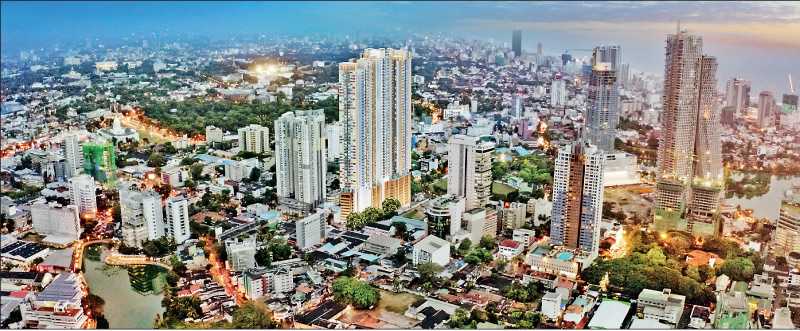Monday Feb 23, 2026
Monday Feb 23, 2026
Wednesday, 21 October 2020 17:19 - - {{hitsCtrl.values.hits}}

 By Nayana Mawilmada
By Nayana Mawilmada
Real estate in central Colombo has been inaccessible to a majority of Sri Lankans for quite some time. But if there was ever a window of opportunity to consider investing, now might be it.
With interest rates in Sri Lanka lower than they have been at any point in recent memory, fixed income options have been drastically limited. With fixed deposit rates now at an extremely low level, formerly dependable and safe investment with steady returns, has now become considerably less attractive. If you want your money to continue growing - or at the very least to preserve its value - real estate may be your best bet.
Investing in real estate, however, is not without risk; and in a crowded marketplace, potential investors should carefully consider their options. An understanding of the dynamics of city evolution may help.
How will Colombo evolve?
Colombo is a city of approximately 650,000 (within the Colombo Municipal zone), with around 800,000 more people commuting into the city every day. Anyone who lives in Colombo understands that the traffic is mind-numbing—around six to seven km per hour at peak times according to researchers. But why? Why do people live so far away? Why do people have to come to Colombo? And why do people really put up with spending literally years of their lives sitting in traffic?
Most higher-paying jobs are still centralised in Colombo. Majority of the leading schools are also concentrated in Colombo. Hospitals, malls, restaurants, and other social infrastructure are also concentrated in Colombo. There is no escaping the fact that Colombo is the epicentre of the country and will likely stay that way for the next several decades at least.
Unfortunately, through a combination of limited affordability, lack of innovation in mortgage lending, sky high construction costs, and inadequate policy direction, the dream of home ownership in Colombo has eluded many. Instead, most in the middle class opt for the six to 10 perch block of land in the suburbs, an incremental build-up of their home, and learn to live with the drudgery of the ridiculous daily commute. Will this change? Well, it could. But only if we as a city really embrace high capacity mass transit. In such a situation, areas that are now 1.5 hours from Colombo will transform into being just 20 minutes away. The city can spread out a little without having too many growth pains, and upward pressure on property prices in the heart of Colombo would ease. Roads, on the other hand, are already pretty much maxed out. Given that our bus service is rather appalling, people aren’t left with much of a choice. Colombo property prices will continue to rise, and if you have a bit of money to invest and get started, you can profit from it.
But what about the pandemic? Won’t everyone move to the suburbs of Colombo?
No, they won’t; at least in my opinion. First, the pandemic is a blip in the trajectory of Colombo’s evolution. In two years, COVID-19 would have come and gone. By the time anyone even thinks about how to rehash the city to face a pandemic, we would have essentially forgotten about it and will not want to spend the money to drastically change things. Second, the fundamental socioeconomic forces driving people to hover around Colombo that I mentioned above will not change that fast. Third, cities provide economies of scale that make it easier to access (or distribute) resources and services, even during a pandemic. Our city is not that dense, really. Less than 10% of people live in apartment style housing. And finally, humans are essentially communal animals. We will always find ways to congregate in communities. Cities are really a manifestation of this basal human instinct.
What does this all mean for the real estate investor?
This dynamic of Colombo’s resilience presents a substantial opportunity for the real estate investor. The intrinsic value proposition of real estate in the heart of Colombo will get stronger, as the debilitating suburban commute gets worse. It will also survive the pandemic. Finding the right value proposition within the city, however, is still not that easy.
Colombo is quite diverse in setting. Proximity to the core (which would be Colombo 1 and 2) combined with the neighbourhood context—whether walkable and well connected—would be important in ensuring convenience and rentability. Picking a developer that has the track record and strength to survive a downturn is also important, particularly if you consider something that is under construction. And of course, finding the right product match for your wallet and lifestyle is critical too.
The mortgage solution
Mortgages give people access, choices, and the ability to afford convenience. It is vital that the housing finance industry gets off its knees and begins to innovate.
At John Keells Properties, we have been focused on mortgages for a while now, as a means to complement our offering at TRI-ZEN—the cutting-edge development on Union Place. Our most recent innovation—the Freedom Mortgage—aims to basically give homebuyers and investors some breathing space and flexibility.
The Freedom Mortgage plan, which essentially ensures customers a two-year interest free period on their mortgage, with the customer paying 20% up front and the bank taking up the remaining 80%. Once that initial payment is made customers don’t need to make another payment for a further two years. After two years, interest payments begin, and capital repayments start three years after that. Interest rates are locked in at 8.75% for five years, or 9% for 10 years with Commercial Bank. Of course, selling the apartment and capturing gains on the full value still remains an option during this entire period.
Why invest now?
While the news cycle may have many of us convinced that the world is about to end, humanity will survive the pandemic; and so will Colombo.
Our city will continue to grow and be the epicentre of our economy, despite the setbacks it currently faces. While we may see a temporary slump in rental demand due to the pandemic and an exodus of expats, we will undoubtedly see that bounce back too.
Interest rates are muted and FDs and other fixed income instruments available today will barely keep you above inflation. At the same time, mortgage costs are also low and banks have pressure to lend, so you can get good deals on housing mortgages.
If you pick the right real estate product in the right location, and you have the discipline to look medium term and ride out the current turmoil, you will likely do very well.
Nayana Mawilmada is the Sector Head of the Property Group and Executive Vice President, John Keells Holdings PLC